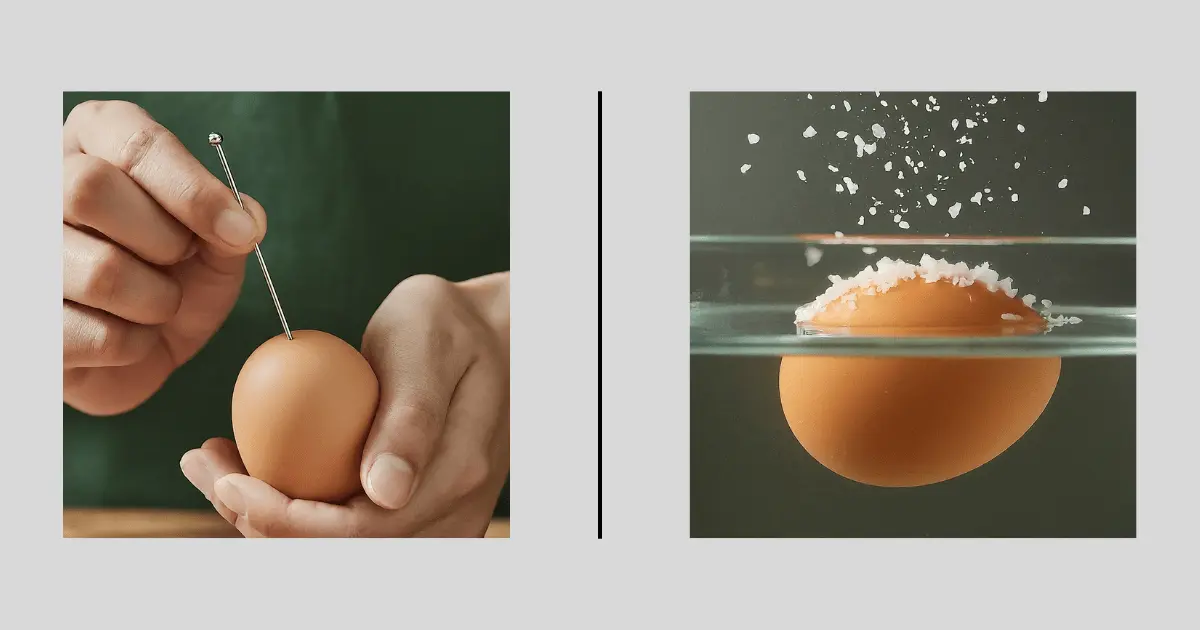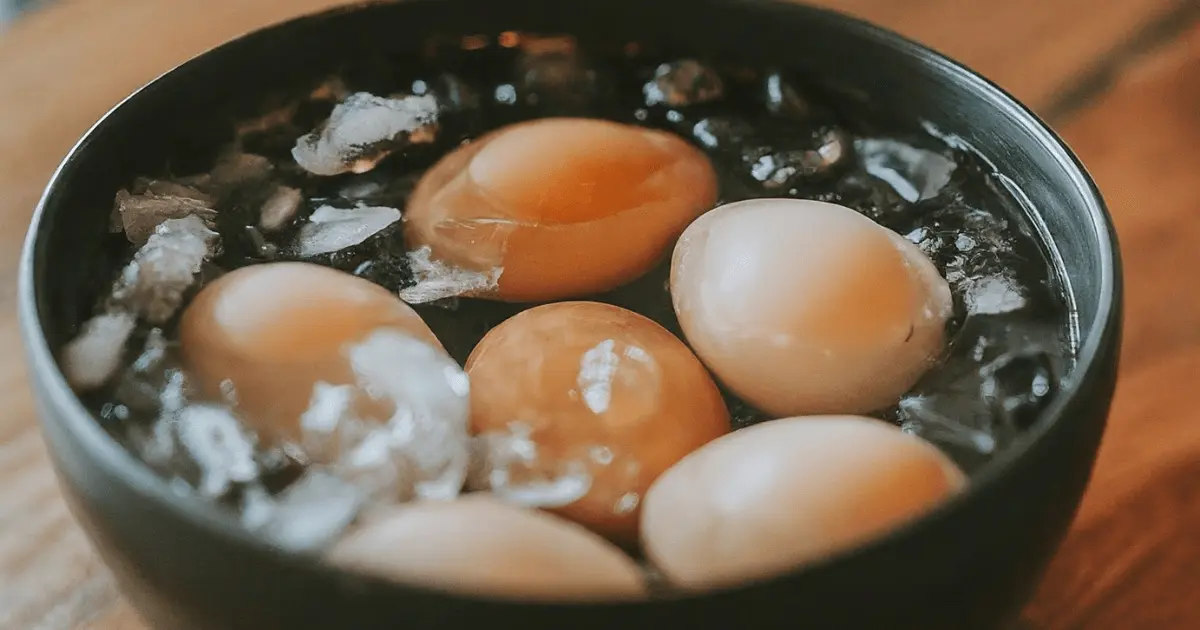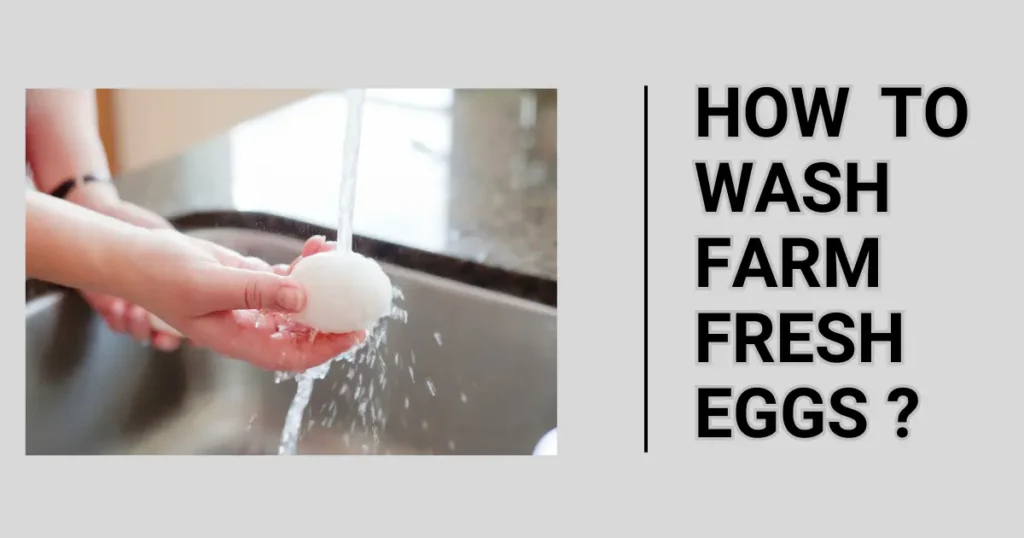Peeling hard boiled farm fresh eggs can be a frustrating game of chance. But fear not, because today we’re going to crack the code to peeling perfection. Forget the mangled mess of yolk and white – with a little science and some fun tricks, you’ll be a peeling pro in no time! So, let’s dive into the why and how of peeling farm-fresh eggs with ease.
Understanding the Egg Structure
Before we become peeling ninjas, let’s crack open the science behind those stubborn farm-fresh eggs. An egg’s got a surprising number of layers: the tough outer shell, the inner membrane (imagine a cling wrap sticking to both the shell and the white), the egg white itself, and of course, the golden yolk.
Here’s the rub: in fresh eggs, that inner membrane is like superglue, clinging tightly to the shell and the white. This makes peeling a frustrating mission. But wait, there’s good news! As eggs age, the inside gets slightly more alkaline (think the opposite of acidic), which loosens the membrane’s grip. That’s why older eggs are generally easier to peel.
The Science of Boiling Eggs
To understand why boiling affects peeling, let’s revisit those protein bonds in the egg white. Remember how fresh eggs have tighter bonds due to their lower pH? Well, during boiling, heat causes these proteins to coagulate and solidify. In fresh eggs, these stronger bonds can cling more stubbornly to the membrane, making peeling a challenge. But fear not, we can use the boiling process to our advantage!
Ideal Boiling Method to Peel Hard Boiled Farm Fresh Eggs

-
Start with Room Temperature Eggs
Allow your farm fresh eggs to come to room temperature before boiling. This cut down the shock of immediate temperature change, reducing the risk of cracks.
-
Use a Pin to Prick the Shell
Gently prick the larger end of each egg with a pin. This small hole allows air to escape during boiling, which can help create a small air pocket that makes peeling easier.
-
Boil the Eggs in Salted Water
Adding salt to the boiling water helps firm up the egg white proteins, making them less likely to stick to the membrane.
-
Cold Water Plunge
After boiling, immediately transfer the eggs to an ice water bath. This shock helps contract the egg white, separating it from the membrane.
Step-by-Step Guide to Peeling Hard Boiled Farm Fresh Eggs
While farm-fresh eggs are amazing, their eagerness to stay stubbornly in their shells can be a challenge. Opt for eggs that have been around for a few days (3-5 days is the sweet spot) – they’ll still be fresh but peel like a dream!
-
Choosing and Preparing the Eggs:
- Fresh vs. Not-So-Fresh: Pick eggs that are a few days old (3-5 days).
- Room Temperature Revolution: Bring your eggs to room temperature to avoid cracking during boiling.
- Pinpoint Precision: Gently prick the larger end of each egg with a pin for a smooth escape of air during boiling.
-
Boiling the Eggs:
- Fill a Pot with Water: Use enough water to cover the eggs by at least an inch.
- Salty Science: Add a sprinkle of salt to strengthen the egg whites, making them less likely to stick to the shell during peeling.
- Vinegar Boost (Optional): Add one tablespoon of vinegar to the water. This can help break down the shell slightly.
- Bring to a Boil: Place the eggs in the pot and bring to a rolling boil.
- Cook Time: Boil the eggs for 10-12 minutes, based on your preferred level of perfection.
-
Cooling the Eggs:

- Ice Water Bath: Immediately transfer the boiled eggs to an ice water bath. Give them at least 15 minutes of resting. This ice bath is your secret weapon! The cold water rapidly contracts the egg whites, creating a nice gap between the white, the membrane, and the shell for a peel-a-licious experience.
-
Peeling the Eggs:
- Tap and Roll: Once cooled, gently tap the egg on a hard surface to create cracks all over the shell. Roll the egg between your hands to further loosen the shell.
- Start at the Larger End: Peel from the larger end where the air pocket is usually located. This can help you get under the membrane easily.
- Water Works Wonders: Enlist the help of your trusty faucet! Peeling under running water helps wash away any stubborn bits of membrane and keeps things nice and mess-free.
Additional Tips and Tricks:
- Planning Pays Off: For ultimate peeling ease, consider letting your farm-fresh eggs age for a week before boiling. A little patience goes a long way!
- Baking Soda Boost: Adding a teaspoon of baking soda to the boiling water can increase the pH of the egg white, making it easier to peel.
- Steaming Success: Steam the eggs instead of boiling for 12-14 minutes. Steaming can make peeling easier because it cooks the egg more gently.
- Vinegar Method: Soak the eggs in a vinegar solution (1 tablespoon of vinegar per cup of water) for an hour before boiling. The vinegar helps soften the shell slightly, making peeling easier.
Why Are Farm Fresh Eggs Harder to Peel?
Ever notice how store-bought eggs peel like a dream, while your farm-fresh beauties leave you with more white than on a zebra? It all boils down to (pun intended!) science.
Farm-fresh eggs are akin to the Usain Bolts of the egg world, brimming with vitality and freshness. Indeed, this youthful exuberance is manifested in a lower egg white pH level, which acts like superglue, creating a formidable bond between the white, shell, and inner membrane. Conversely, as an egg ages, a subtle increase in pH occurs, gradually weakening this adhesive bond, thereby facilitating the peeling process. So, the fresher the egg, the trickier the peel. If you use old eggs that are stored in the refrigerator than it’s a whole different game but for that it’s also important to know how long it can be fresh in the refrigerator. To learn more about that check the article linked below:
How Long Do Farm Eggs Stay Fresh in the Fridge?
Comparative Methods for Peeling
Method |
Description |
Advantages |
Disadvantages |
Best For |
Tips for Success |
Pricking Shell |
Using a pin to prick a small hole in the larger end of the egg. | Creates an air pocket, which helps with peeling. | May cause leakage if not done carefully. | All types of fresh eggs. | Use a clean, sharp pin and be gentle to avoid cracking the egg. |
Salted Water |
Adding salt to the boiling water. | Firms up egg whites, making them less likely to stick to the shell. | Requires precise measurement for effectiveness. | Few days old fresh eggs | Use a teaspoon of salt per liter of water. |
Cold Water Plunge |
Transferring eggs to an ice water bath immediately after boiling. | Causes egg whites to contract, pulling away from the shell. | Must be done immediately to be effective. | All boiled eggs. | Prepare the ice water bath in advance to ensure immediate transfer. |
Baking Soda |
Adding baking soda to the boiling water. | Increases the pH of the egg whites, making them easier to peel. | Can alter the taste of the eggs slightly. | Very fresh eggs. | Use a teaspoon of baking soda per liter of water. |
Steaming |
Put the eggs into a steamer basket and set it over boiling water. | Gentle cooking reduces the risk of shell sticking. | Requires a steamer setup. | Delicate fresh eggs. | Steam for 12-14 minutes and then transfer to an ice water bath. |
Vinegar Method |
Soaking eggs in a vinegar solution before boiling. | Softens the shell, making peeling easier. | Eggs need to soak for at least an hour. | Eggs with very tough shells. | Use 1 tablespoon of vinegar per cup of water and soak for an hour before boiling. |
Older Eggs |
Allowing eggs to age for a week before boiling. | Higher pH in older eggs makes peeling easier. | Requires planning and storage space. | Preparing in advance. | Store eggs in a cool, dry place for a week before boiling. |
Cold Start |
Placing eggs in cold water and then bringing to a boil. | Reduces the risk of cracking and helps with even cooking. | Can be less precise with timing. | All boiled eggs. | Start with eggs at room temperature and use enough water to cover the eggs completely. |
Tap and Roll |
Gently tapping the egg to make cracks and then spinning it between your hands. | Helps create uniform cracks, making the shell easier to remove. | Can be messy if not done over a sink or bowl. | Peeling cooled eggs. | Use a gentle but firm pressure to avoid crushing the egg. |
Peeling Under Water |
Peeling eggs under running water or in a bowl of water. | Water helps slide the shell off and prevents membrane from sticking. | Requires access to a sink or bowl of water. | Final step in the peeling process. | Use cold water to help keep the egg firm and reduce the risk of tearing the egg white. |
Pressure Cooking |
Cooking eggs in a pressure cooker for precise timing and even cooking. | Consistent results with easy peeling. | Requires a pressure cooker. | Large batches of eggs. | Follow specific instructions for your pressure cooker model for optimal results. |
Adding Vinegar to Boiling Water |
Adding a tablespoon of vinegar directly to the boiling water. | Helps break down the shell slightly, making it easier to peel. | Can impart a slight vinegar taste to the eggs. | Fresh eggs that are difficult to peel. | Use a tablespoon of vinegar per liter of water and boil as usual. |
Quick Release in Pressure Cooker |
Using the quick release method to release pressure after cooking eggs in a pressure cooker. | Prevents overcooking and makes peeling easier. | Requires careful handling to avoid burns. | Consistent peeling results with fresh eggs. | Follow your pressure cooker’s manual for safe and effective use of the quick release method. |
Sous Vide Cooking |
Cooking eggs at a precise temperature using a sous vide machine. | Even cooking and easy peeling due to precise temperature control. | Requires a sous vide machine and more time. | High-quality results with minimal cracking. | Cook eggs at 194°F (90°C) for 9-13 minutes, then move it to an ice water bath. |
Handling Some Common Peeling Problem Like PRO:
Even with the best techniques, sometimes things go awry. Here’s how to handle some common peeling problems:
Shell Sticking to the Egg White
- Solution 1: This rapid cooling process causes the egg white to contract significantly, creating a crucial gap between the shell and the egg white, thus simplifying the peeling process.
- Solution 2:Incorporating an additional tablespoon of vinegar into the boiling water can subtly weaken the shell membrane, facilitating a smoother peeling experience.
Egg Whites Coming Out Uneven
- Solution 1: Steaming to the rescue! Steaming eggs instead of boiling can result in a more gentle cook, reducing the risk of uneven white. Give steaming a try!
- Solution 2: Patience is a virtue. If you have the time, letting your farm-fresh eggs age for a few days before boiling can make a big difference in peeling. The increased pH in older eggs makes them peel more smoothly.
Cracked Shells During Boiling
- Solution 1: Start with room temperature eggs. Cold eggs are more prone to cracking when they hit hot water. Let your eggs come to room temperature before boiling.
- Solution 2: Give your eggs some breathing room. Don’t overcrowd the pot! Having too many eggs in the pot can cause them to bump and crack during boiling.
From Frustration to Farm-Fresh Fun!
Now that you’ve cracked the code on peeling farm-fresh eggs (pun intended!), you can say goodbye to kitchen frustration and hello to breakfast (or lunch, or dinner!) time bliss. With these peeling superpowers at your fingertips, you’ll be a master of perfectly peeled eggs, ready to tackle any recipe – from classic egg salad to show-stopping deviled eggs. So go forth, conquer those stubborn shells, and savor the incredible flavor of farm-fresh eggs without the fuss. Happy peeling!



